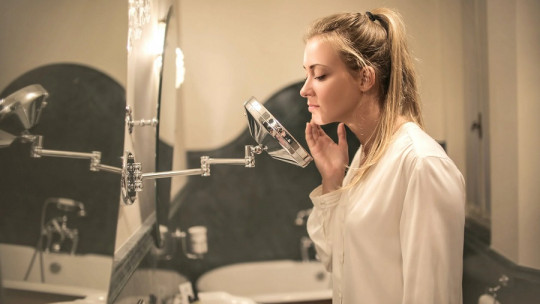
One of the most striking curiosities of the human mind is that, although human beings tend to think that we have an individual essence and a very well-defined identity, in reality our self-esteem and the perception we have of ourselves constantly change; It is greatly influenced by what happens to us throughout life. In other words, what happens around us influences our identity and way of seeing ourselves as much or more as internal psychological processes.
Furthermore, these types of transformations do not have to take long to take place. Sometimes, it is a matter of days, and even if it happens very quickly, it is common for us not to notice the change in our way of seeing and valuing ourselves. Thus, Something as normal as the arrival of summer can cause our self-esteem to suffer damage partly because of what happens in the environment with which we constantly interact: advertisements of young and happy people on paradisiacal beaches, social pressure regarding fashions that reveal many parts of the body at the same time, expectations about “summer romances” , etc.
In these cases it usually happens that many people assume that what they feel when they see themselves in the mirror at this time is what truly defines their identity, and that the rest of the seasons have limited themselves to not thinking about what they really are, hiding it under layers of clothes… Without realizing that summer (and all the social dynamics around those months) is not an observatory that allows us to see ourselves in a more objective way than any other season of the year.
Therefore, in this article we will address the topic of How the overexposure we undergo in summer can lead to insecurities with our physique being enhanced affect the image we have of ourselves and develop anxiety.
Why does the arrival of summer make us see ourselves with different eyes?
To understand the way in which summer predisposes us to relate in a different way to our own body, it is first necessary to understand what self-esteem is. This is, fundamentally, the way in which we have learned to perceive and value ourselves.
Like all human beings without severe neurodevelopmental problems, we become capable of thinking about the concept of “I” and we use it constantly every day (because all the actions we perform daily and everything that our senses register are linked to that idea. of the “I”, are things that we do or that happen to us), this learning is constant and takes place throughout the world, voluntarily or involuntarily. Thus, all conscious people have self-esteem, because they cannot not be aware of themselves.
Now, what we learn about ourselves is always linked to a strong emotional charge. It is not about internalizing objective information about who we are, nor data about the “I” that can be reduced to words and numbers. What we know about ourselves does not leave us indifferent always makes us feel a certain way, and has a great ability to alter our mood.

Precisely because this concept of oneself is one of the most important to survive, we must always be very sensitive to what we experience when interacting with the environment to try to adapt to it… although it has its good points and its bad. For example, it often means that we do not question what causes a situation to make us feel bad about ourselves; We simply focus on those feelings and emotions and assume that they are a reflection of how we react to our identity.
This is what often happens with the arrival of summer: society is transformed in a matter of a few weeks, and a series of cultural elements and expectations are activated about what we are supposed to aspire to do in these months, and in what kind. of (idealized) people we must aspire to be alike. This causes us, without realizing it, to adopt another perspective when perceiving and valuing ourselves, and we take these feelings for granted without critically analyzing why summer affects our self-esteem in this way.
It is easier accept as revealed truth that feeling of being a failed person project when seeing ourselves in the mirror than trying to break down why we feel that way and why we give such a high value to how we feel in that specific situation.
This is how insecurities with our body can intensify in summer
But… What are the specific ways in which the monitor affects our self-esteem and our predisposition to suffer problems of anguish or anxiety in front of the mirror? The truth is that there are hundreds of factors that can come into play depending on the person, but there are some more relevant than others. In general, the main ones are usually the following.
1. Intensification of the cult of body image
Human beings depend a lot on the sense of sight, and the progress of new audiovisual technologies linked to the Internet, together with the culture of immediacy that this has promoted, means that we have taken to its ultimate consequences the maxim of “an image Worth more than thousand words”.
This encourages us to see body image as a reflection of our identity, so it is very easy for us to automatically and semi-consciously become obsessed with the small details of our body that we consider imperfections because they do not fit with the canons of beauty. That is to say, although the cult of the image does not speak ill of ourselves, it does create the necessary conditions for us to examine ourselves until we find reasons to feel bad about our bodies.
2. Social pressure fueled by overexposure on social networks
For many people, constantly posting images of their body on their social networks is almost an obligation. Given this, the arrival of summer exploits one’s insecurities, especially considering that doing so without publishing any photographs in a swimsuit or with very summery clothes can be seen almost as an eccentricity or a sign that one does not have a body. pretty.
3. Gender roles and sexualization of the female body
It’s no secret that women are under much greater pressure to take care of themselves and always look attractive. To this we must add that in their case, the value of oneself as a person is much more linked to the value one has as a sexually desirable body.
4. Group expectations linked to the feeling of belonging to the group
Pressure to not be the person who excludes oneself from a group of friends for not wanting to participate in activities that involve wearing lighter clothing or a swimsuit can also play an important factor. That is Not doing so can be seen as a problem, something that must be justified something that brings up the taboo topic of insecurities with one’s own body and low self-esteem.
5. Culture of extreme diets
Finally, it should be noted that for many people the arrival of summer goes hand in hand with the need to follow diets that, although they are sold as a strategy to have a healthy body, are in reality a bomb of stress and anxiety due to the tight control over the calories ingested and the types of foods to avoid that they propose (or can even be bad for physical health directly because they lead to malnutrition). Both this obsession with avoiding inappropriate foods and the health problems they promote are elements that predispose to suffering psychological complications such as generalized anxiety, insomnia, psychological rumination, etc
Are you looking for psychological assistance to strengthen your self-esteem?
If you want psychotherapeutic support to overcome your complexes and insecurities with professional help, I invite you to contact me to schedule a first session.
My name is King Pigeon and I am a General Health Psychologist for the adult and child-youth population; I can assist you in person or through online therapy by video call.








